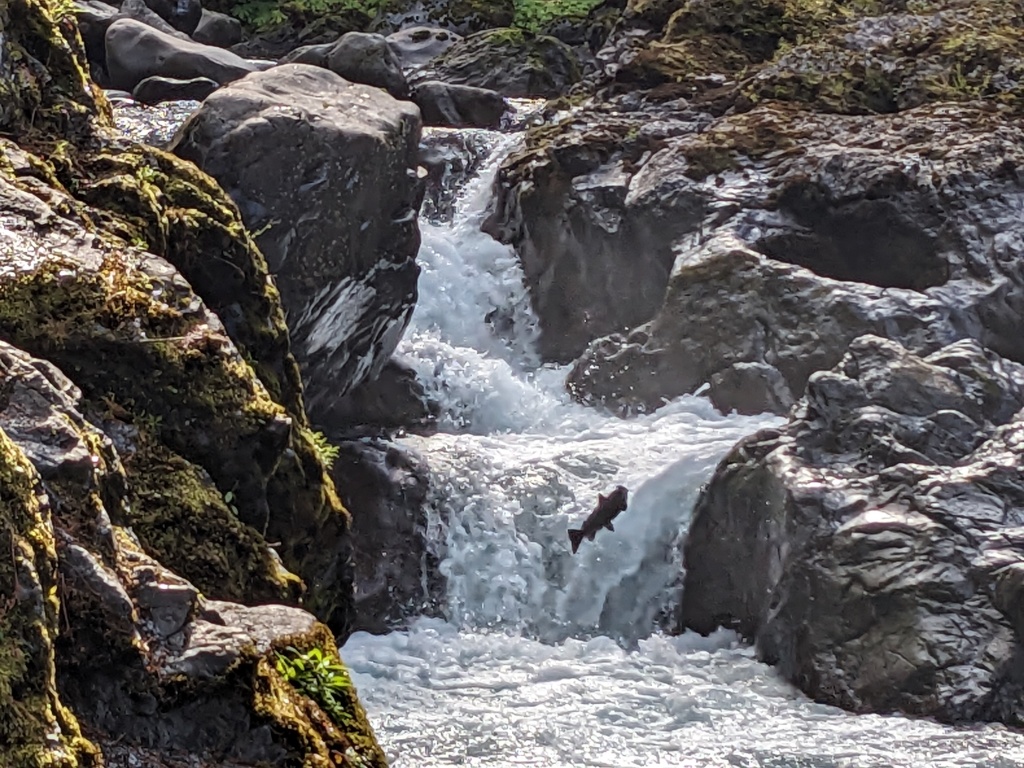
This fall, I got to see something that I’d never seen before, having not been that long in the Pacific Northwest: Salmon leaping upstream, trying to get back to the place where they were born so as to spawn the next generation, and then die. I knew about this, of course, but I had never seen it and I didn’t know just how violent and tough it is. My friend and I were driving along the Sol Duc river and pulled over because we saw a lot of cars by the side of the road. We scrambled down rocks to near the water’s edge to watch these big black Coho salmon fling themselves up a short waterfall, although most didn’t make it, and those that did often fell back down again. Many leaped at the wrong angle, thus slamming themselves into a rock by the side of the stream with a loud thud.
The information sign by the side of the road said that these salmon swim as far as 70 miles to get to their spawning place, but the ones we watched weren’t getting much of anywhere. We followed a short trail maybe 100 yards upstream or less and saw no salmon. Where were they stopping? Consumed with curiosity, we slid and stumbled our way across the big round rocks along the river, backtracking until we could see the crowd gathered by the side watching the salmon leap. In the water right above that spot, My friend spotted just a few in the white water, although I couldn’t see them. Past there, there were none at all.
What the heck was going on? Those with more expertise than I have tell me the water was probably too low for them. Western Washington had a mercifully mild-ish summer this year, and although as always these past few years there were lots of wildfires to the north and and south, the smoke mostly stayed in the upper atmosphere or blew away elsewhere. But there’s no question times are changing, the climate is changing, and one result is that water in the streams and rivers is getting lower.
The next day, we went back to the same spot and the salmon were no longer trying to make their way upstream. Instead, they were gathered in a tight group near the bottom of the waterfall, just sitting there. Waiting for higher water. Salmon are patient and determined but they don’t have forever. They stop eating before they make their upstream trek and whether they get where they’re going or not, will soon die. Michelle says they’ll keep trying to make it upstream, even as their bodies begin to decay. Time is against them, which makes them the same as me and all of us.
When we walked along the river to try and figure out where the salmon had stopped their journey, my feet unexpectedly slipped out from me as I stepped on a rock. The fall itself would likely have been fine, but even though I knew better, I instinctively stuck out my right arm to catch myself and landed hard on on my wrist and forearm.
It was surprisingly painful. I sat up, but then stayed put for a moment before getting to my feet again. I was nauseated, a feeling I remembered from many years ago when I fell off a horse and badly broke my arm (the left one that time). I could have called out and told my friend I was hurt, but that was the last thing I wanted to admit to. She was walking ahead of me and didn’t see me go down, so I set the nausea firmly aside, scrambled to my feet and went after her. When I caught up to her, I told her I’d fallen, but not how hard.
I hadn’t broken anything, I found out when I finally got an x-ray five days later. But I easily could have. By morning, even though I’d iced the area, my wrist and forearm were a weird shade of brown that slowly transitioned to purple over the next couple of days. Picking up anything heavier than a piece of paper hurt. Circling my wrist around was excruciating. For days, the feeling of frequent pain and fragility kept me from doing much of anything physical.
What made the pain worse was the underlying feeling that, but for a bit of luck, I could have broken my wrist and wound up with a long-term recovery. I kept thinking about my aunt, who spent her whole life creating masterful still lives in oil, falling and breaking her wrist and finding that even after it healed she was permanently crippled and could no longer paint or do many of the other things she’d been used to doing for herself. When she died, she was less than ten years older than I am right now.
I’ve had the luxury of really good health. I’ve watched Bill struggle with health issues–some of my friends too–and I know what a gift it is to have a body that does what I expect and that feels good most of the time. This was an uncomfortable reminder. Just like the salmon, just like everyone else, I only have so much time.
